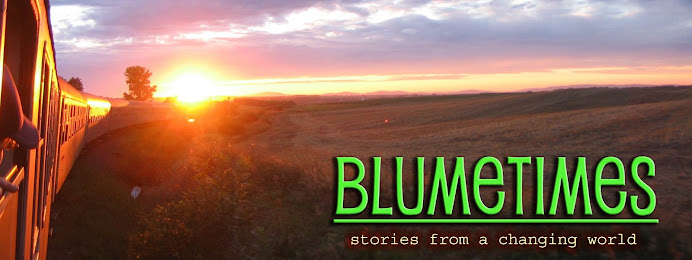"Not only is another world possible, she is on her way. On a quiet day, I can hear her breathing."
- Arundhati Roy
As a climate activist, someone who spends the bulk of her time trying to awaken the community to the realities of climate change and peak oil and enliven people to do something about it, it’s very easy to focus on where we’ve gone wrong. It’s almost effortless to bemoan the amount of destruction we humans have heaped upon the planet. I have no problem alternating between fear, despair, and rage when I contemplate how many climate tipping points we’ve crossed and how close we are to losing the planet’s ability to support life and civilization as we know it. It’s so easy to feel both flabbergasted and powerless in the face of our apparent lack of passionate, gung-ho readiness to do something about it.
Despite the remarkable spectacle of people in 181 countries creating 5200 events for 350.org’s first international day of climate action on October 24, 2009 [note: and an even bigger turnout on October, 10, 2010], despite the pole-to-pole call for strong action and bold leadership on the climate crisis, I am deeply influenced by the doubt most experts express at the ability of the delegates at this December’s international climate conference in Copenhagen to walk away from the table with a solid, science-based, toothy climate treaty in hand.
I want more than anything to believe we are capable of addressing the climate crisis, and in fact I do believe more than anything that we’re capable of it. I’m just not so sure we’re willing to take it on. Why? Because the reality of addressing the problem involves profoundly scaling back from the lives we’re currently leading.
We are a civilization which has built its foundations upon fossil fuels. We use them to get us to the corner store and we use them to get us into orbit. We use oil to make everything - from asphalt to aspirin, deodorant to duct tape, vitamins to volleyballs. We use fossil fuels to build our homes as well as light and power and heat them. Oil is the mainstay of commercial agriculture’s pesticides, herbicides, fertilizers, and antibiotics – and oil drives all the machinery and equipment used to grow, harvest, process, and distribute our food.
The reality we’re facing is that not only does all this industrial and agricultural activity pour carbon dioxide and a host of other greenhouse gasses into the atmosphere and heat up the planet – which is bad enough – but we’re also facing the fact that we have maximized global oil production. This is known as Peak Oil. We’re not running out per se, but oil is getting harder to find and more expensive to produce. Which means that all the elements of our society which have been based on cheap oil and the massive amounts of energy contained therein are going to get much more expensive as well – prohibitive to the smooth running of the global economy as it’s currently structured. Or, as Dr. Fatih Birol, chief economist with the International Energy Administration, recently stated: “We must leave oil before it leaves us.”
But here’s the thing: I don’t blame us. We may have wreaked incredible havoc on the planet, but we didn't mean to. In fact, I’m in awe at the depth and breadth of humanity's creativity and ingenuity. We found a mess of black sludgy stuff in the ground, and look what we’ve done with it! In fact, I look at what humanity has created during the vast scope of our history, both pre-oil and during this little energy boom, and I’m blown away. We've made paintings on grains of rice and built rockets to the moon. We've made cathedrals and tinker toys and spandex and haute cuisine and rock and roll and the Hubble telescope and iPhones and sneakers and giant Buddhas and pyramids and mummies and illuminated manuscripts and samurai swords. We built the towers of the World Trade Center and then tightrope-walked between them. We research and dissect and explore and learn and dance.
So, what do I believe? I believe that if we can harness ourselves, we can clean up the mess we've made – even now, at the 11th hour. More than clean it up, I believe we can re-make the world with a constructive power that rivals and even surpasses our destructive power. I believe that even in a carbon-constrained world, we can have remarkable lives of novelty and meaning and humor and adventure and purpose and fun and love. I believe that in 20 or 50 or 100 years things probably won’t look anything like they do now, and that the shocks to our collective system and the changes to our way of life will be challenging to absorb at first. But I also believe that we are incredibly courageous, infinitely creative, and supremely adaptable, and I believe it is our moral responsibility to step up to this task placed upon us. It’s up to us. There is nobody else.
I also believe that no matter what happens, there’s meaning and value in taking action, in being part of this chapter of humanity’s story. Because in all likelihood, something or someone will survive. And whatever the conditions of their life are, whoever they are, I would want them to know that someone tried to hold things together on their behalf. I would want them to know that someone was thinking of them, living there, farther on down the road. I would want them to know that someone, whoever they were, didn’t give up.




No comments:
Post a Comment